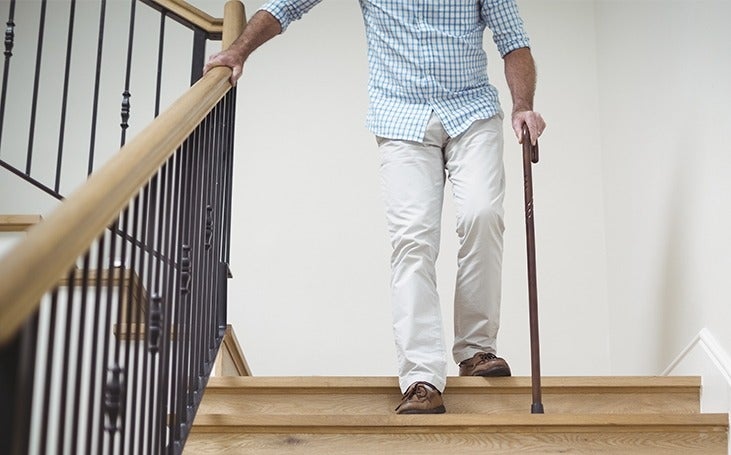Worried About Falling? If You’re Over 45, You Should Be.

The Centers for Disease Control and Prevention (CDC) reports the No. 1 reason for adults over the age of 45 visiting the emergency room is—you guessed it: FALLS. If you are a woman over the age of 45, you have a higher risk of falling than men of the same age. While the chances of injury due to a fall at this age is relatively low, your chances of falling again doubles and injury risk increases with age.
Have you suffered from falling before?
One in four adults 65 and older fall each year. Many people fear falls because they lead to injury and a loss of independence. This steers people to not report their falls to their family or their doctor. In fact, of the one in four adults that fall each year, less than half report the fall.
Most falls can be prevented. Talking to the doctor is the first step in preventing falls.
Top reasons for falls
True or false: People fall because they age. FALSE.
People fall because of other underlying reasons: some linked to physical conditions, medical problems, medications, and even safety hazards in and around the home.
Many falls are caused by these factors:
- Muscle weakness
- Poor balance
- Medicines
- Foot problems
- Vision problems
- Clutter or hazards in or around your home
Lots of these can cause you to fall at any age. In fact, there are some studies suggesting risk assessment on falls should begin at age 45, not 65 for adults.
Tips to prevent falls and stay independent
Talk to your doctor
Your doctor might suggest a falls assessment, changes to medication or supplements, new eyewear prescriptions, physical therapy, and possibly a walking aid. Your doctor should know about any falls you have had and if you’re worried about falling
Begin strength and balance exercises
Exercise helps prevent falls by strengthening your muscles and improving your balance. Tai chi and qi gong are two popular Chinese movement exercises known for improving balance, coordination, and flexibility. Learn more about these alternative therapy options for balance here.
Looking for other exercises to improve your muscle strength? Try doing some of these each day to keep your balance and strength.
Plus, Care Partners of Connecticut HMO and PPO members can use their SilverSneakers benefit to stay fit!
Update your eyesight
Have you had your eyes checked recently? Visit your optometrist once a year so you can update your eyeglasses. Make sure you have glasses if you need them or have the correct prescription for the glasses you do have. Poor vision and conditions like glaucoma and cataracts can increase your chances of falling. Learn cataract symptoms and some ways to slow cataract growth here.
Remove hazards
Update your home to allow for clear pathways, remove loose rugs and cords, keep stairs free from clutter, and install bright lights, grab bars, and railings in and around your home.
Do you worry about or have a fear of falling?
Many people do. Six out of ten falls happen in the home. Use this checklist to make sure you are doing everything you can to prevent falls in and around your home.
Contact our Care Management Team to learn more about fall prevention and whether a no-cost in-home safety assessment is right for you. A Care Manager is available to all CarePartners of Connecticut members at no cost. For more information about working with a Care Manager, call Member Services at 1-888-341-1507 (TTY: 711)
